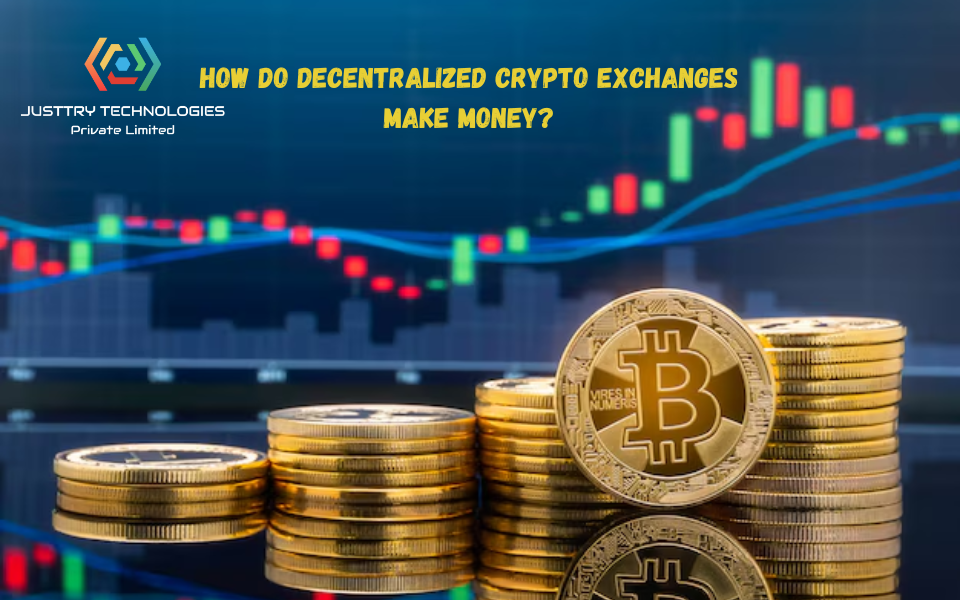How Do Decentralized Crypto Exchanges Make Money?

Decentralized crypto exchanges (DEXs) are changing the game by offering users secure, non-custodial trading. Unlike centralized exchanges, which act as intermediaries, DEXs enable peer-to-peer transactions without third-party control. But if there’s no central authority managing funds, how do these platforms generate revenue?
In this blog, we’ll explore the various ways decentralized crypto exchanges make money and how businesses can capitalize on this innovative market.
1. Trading Fees – The Revenue Model Nucleus
Decentralized crypto exchanges derive their main source of income from trading fees. The fees come into play whenever users exchange tokens, providing a constant source of revenue for the platform.
-
Maker & Taker Fees – DEXs collect a minimal fee when users contribute liquidity (makers) or trade (takers).
-
Gas Fees – Others generate revenue by tacking on a small markup on blockchain transaction fees.
-
Dynamic Pricing – Charges can change according to network congestion, asset volatility, or volume of trade.
2. Liquidity Pool Fees & Yield Farming
Decentralized crypto exchanges rely heavily on liquidity pools. These pools enable users to exchange assets without depending on a conventional order book system.
-
Liquidity Provider Fees – Part of the trading fees is paid to liquidity providers, but the exchange can keep some percentage as platform income.
-
Yield Farming & Staking – Certain DEXs provide rewards to users for locking up their tokens, earning a share of the staking rewards.
-
Impermanent Loss Mitigation – Exchanges can implement measures that charge a small fee for liquidity risk management.
3. Token Listings & Premium Features
Decentralized exchanges earn revenue by providing premium services for emerging crypto projects to list their tokens.
-
Token Listing Fees – Projects pay to list their token on a DEX, particularly if the exchange has a large user base.
-
Sponsored Pools & Promotions – Developers can purchase to feature their token in certain liquidity pools.
-
Tiered Memberships – Certain DEXs offer upgraded access to advanced trading tools, analytics, or priority listings.
4. Governance Token Model & Treasury Funds
Most decentralized exchanges create native governance tokens, which the holders can vote on decisions for the platform. Tokens are also a source of revenue.
-
Governance Token Sales – The governance tokens are sold by exchanges as a source of capital for development.
-
Platform Fees in Native Tokens – Users are offered rebates for trading fees when they use the native token of the exchange.
-
Treasury Fund Management – Some exchanges invest part of their revenue in DeFi projects or protocol improvements.
5. Cross-Chain Swaps & Interoperability Solutions
Decentralized crypto exchanges are growing revenue streams as multi-chain ecosystems become popular.
-
Bridging Fees – Customers pay charges when exchanging assets between blockchain networks.
-
Multi-Chain Liquidity Incentives – DEXs collect fees for providing liquidity between chains.
-
Integration with Layer-2 Solutions – Some charge a minor fee for quicker and less expensive Layer-2 transactions.
6. White-Label & Custom Development Services
Several crypto exchange development firms provide white-label DEX solutions, enabling companies to launch their exchanges.
-
White-Label Licensing – Companies pay to utilize a pre-developed exchange infrastructure.
-
Customization & API Access – Additional charges are levied for customized features, security integrations, or API access.
-
Ongoing Maintenance & Security Audits – Some firms charge for regular updates, bug fixes, and compliance audits.
Why Businesses Are Investing in Decentralized Exchanges
Decentralized exchanges are not just a fad—they're defining the future of cryptocurrency trading. As crypto exchange platform development gains popularity, companies are using the DEX model to build sustainable sources of revenue.
-
Increased User Adoption – More and more traders prefer decentralized platforms for security and control.
-
Scalability & Innovation – The use of newer blockchain technologies simplifies high-performance DEX development.
-
Lucrative Business Model – Having multiple sources of revenue provides financial stability for exchange operators.
If you’re looking to enter the crypto exchange market, partnering with a top crypto exchange development company can streamline your journey.
Final Thoughts
Decentralized crypto exchanges make money through trading fees, liquidity pools, token listings, governance models, cross-chain swaps, and white-label solutions. As blockchain adoption grows, these platforms continue to evolve, offering exciting opportunities for businesses and developers alike.
Do you want to build your crypto exchange platform? Get in touch with a cryptocurrency exchange development service to create a solid and revenue-generating DEX.
- cryptocurrency_exchange_development_company
- crypto_exchange_platform_development
- Cryptocurrency_exchange_development_service
- Top_Crypto_Exchange_Development_Company
- Crypto_exchange_developers_in_India
- crypto_exchange_software_solutions
- crypto_exchange_platforms
- crypto_exchange_platform_solution
- cryptocurrency_exchange_platform_solution
- cryptocurrency_exchange_software_solution
- crypto_exchange_platform_solution_provider
- crypto_exchange_software_development
- crypto_exchange_platform_development_company
- Questions and Answers
- Opinion
- Motivational and Inspiring Story
- Technology
- Live and Let live
- Focus
- Geopolitics
- Military-Arms/Equipment
- Security
- Economy
- Beasts of Nations
- Machine Tools-The “Mother Industry”
- Art
- Causes
- Crafts
- Dance
- Drinks
- Film/Movie
- Fitness
- Food
- Games
- Gardening
- Health
- Home
- Literature
- Music
- Networking
- Other
- Party
- Religion
- Shopping
- Sports
- Theater
- Health and Wellness
- News
- Culture

